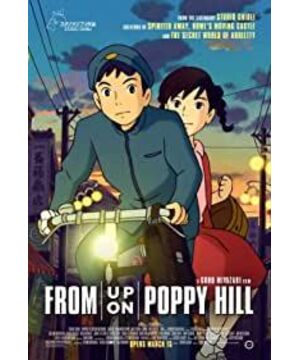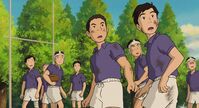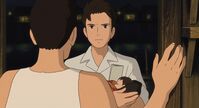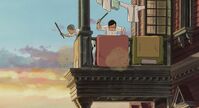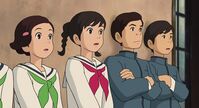At the beginning, the girl reminded me of Sophie in Howl's Moving Castle, who is used to taking care of people and has mature and sensible beyond her age. The picture is as beautiful as ever. Every time I watch an animation with a Miyazaki card hanging, it has this delicate, fresh and warm beauty. The encounter between the protagonists seems a bit funny, and I have no difficulty connecting the front and back to outline the general situation. However, that doesn't stop me from continuing to watch.
I have been thinking that such a story should be a certain part of the playwright's youth. This film has a strong background of the times. The Tokyo Olympics is about to be held, the society is facing reforms, and the old and new are changing. The state and reaction of people in such a situation are depicted quite realistically.
Back to the part I want to talk about the most. Xiaohai has a kind of independence and generosity that I like. Seeing her standing between the wind and the water and nodding gently, the beauty of a woman is self-evident. Her encounter with Xiaojun was dramatic. We meet again, generous, friendly and kind. I liked the part where he rode a bicycle and drove her all the way. The background of the small seaside town was the youthful heart. Xiaohai later walked home alone, with a slightly upward smile. The feeling of youth, straightforward and subtle.
Seeing Xiaohai raising the flag, Xiaojun explained the meaning of the flag, his eyes were sly, and he gently echoed the poem at the beginning, a painting drawn by a certain sister (can't remember the name). We don't know when we have been amazed by someone's youth, nor do we know that we have been watched silently for so long by a person and written into his youth by him. Perhaps at that time we were also busy watching someone and writing someone into our youth. Every time I think about this, I always have all kinds of warm feelings.
The turning point of the story, I accidentally guessed, but I think the story should not be so bloody, it is too out of style. The place where the story made me cry is when Xiao Hai dreamed of seeing her parents who missed her every day, watching her excitement, and then waking up dejected, child, I feel sorry for you. We have all had times like this, because we are very eager, so we only think about it in our dreams. Honey, when I see you get up in the morning to go to school and approach him with a generous smile, I really want to hug you. I really love girls like this. I often meet girls who give me a lot of insight. They are beautiful, smart, and kind. I will feel sorry for them, but it is more a deep love for them, a unique quality of a person that makes you love from your heart. I love Xiao Hai's light nod, the most beautiful is the tenderness of the bow, but I also see a kind of stubbornness. Perhaps she carried in her the stubbornness of a father who dared to go sailing against the family's will and a mother who dared to elope. Mentioning the parents seems to be the heavier part of the film, as well as the background of the war. The carefully collected photos, the thoughtful expression when raising the flag every day, and the memories that come to mind from time to time are the softest place in Xiaohai's heart.
The story of youth always has many points and faces that resonate with you. During the cleaning, the boys were in a hurry and the girls were scolding. It was so noisy that the teacher came in and sang in an orderly manner. Or the chairman's words came directly, "Skip class, youth". Some time, no matter how you pass it, seems to be wasted, that is called youth. Xiaojun stretched out his hand to catch Xiaohai who jumped over, young and handsome.
The film's soundtrack seems to feel different from previous works, but can't tell the difference. The film is frozen on the oil painting, the ending song is played, the song is melodious, and the Chinese subtitles are translated so beautifully, I only know that I will stay like that until the end of the film.
I like the part where Xiaojun rides Xiaohai the most. Originally, Xiaohai wanted to ask if he wrote the poem, but the mountain road was steep for a while. When Xiaojun asked her what she wanted to say, Xiaohai said nothing. Really, some things are so good you don't want to ask why.
View more about From Up on Poppy Hill reviews


